Herb Salts Are Super Easy And They're Both Practical And Pretty. I Used Rosemary, Oregano, Sage, And
Herb salts are super easy and they're both practical and pretty. I used rosemary, oregano, sage, and a bit of thyme in this batch, with rosemary as the dominant flavor. By using fresh herbs you let the liquids soak into the salt for a stronger flavor than you'd get just mixing dried herbs with spice. I'm not giving measurements because I don't really use them, though you can find recipes online with specific proportions. Really you just need enough salt to absorb this moisture and not dominate the herb flavors.
Take your herbs and rinse them clean , then pat them dry. Strip all the leaves off the stems and put them into a grinder. If you don't have a grinder, you could get the same effect by dicing really really tiny or by using a mortar and pestle, but really the grinder speeds things up a lot.




Grind the leaves of the herbs until they're finely chopped. Then add some salt. I use a coarse kosher salt, because it gets ground a bit finer in this process, and a chunky salt is great texture for most of the uses I'd have for this. If you're making it as popcorn seasoning though, a fine salt is better, and run the grinder extra long to make it super fine. For coarse salt, just pulse the grinder a bit to get things combined evenly.





Then everything gets spread out on parchment paper in a pan and put into the oven at 200 degrees for roughly half an hour, or until dry to touch. You could also just let it air dry like this for several days if you don't want to use the oven. Then just stick it into an airtight container to store! If you skip the oven drying stage you'll need to keep it in the fridge and use it within about a month, but if you dry it it's good for ages. The best flavor is in the first six months though.
More Posts from Solarpiracy and Others






March 8, 2021 - Feminists on International Working Women’s day in Mexico City attacked riot police at the national palace, in protest against the high rates of violence against women in Mexico and the police’s inaction against it. [video]/[video]/[video]
French senator Claude Malhuret sums up the world made by the current American administration, 5 March 2025




anyway yeah DELETE YOUR FUCKING ADVERTISING IDS
Android:
Settings ➡️ Google ➡️ all services ➡️ Ads ➡️ Delete advertising ID
(may differ slightly depending on android version and manufacturer firmware. you can't just search settings for "advertising ID" of course 🔪)
iOS:
Settings ➡️ privacy ➡️ tracking ➡️ toggle "allow apps to request to track" to OFF
and ALSO settings ➡️ privacy ➡️ Apple advertising ➡️ toggle "personalized ads" to OFF
more details about the process here via the EFF





The #1400challenge - How to turn stimulus checks into collective power | Inhabit
The last year has demonstrated just how razor thin our margin of survival is—from the brutality of the police to the viciousness of the virus, from the absurd ups-and-downs of the economy to the glaring incompetence of the government.
Now that they’ve been forced to send some cash our way, we’d like to propose a little something they maybe didn’t expect. The idea is simple: what if we took our stimulus checks and put them towards collective use?
In recent weeks Inhabit has been collaborating with groups around the country to put together a series of kits called the #1400challenge. The result is a handful of introductory guides for a variety of collective projects—from soundsystems and meshnets to pop-up dwellings and community gyms.
Each project is based on a proven and replicable idea, a working model that has already seen action in the streets and in neighborhoods. And each could be a jumping off point for new designs, new skillsets, new encounters, and newly expanded frontlines in the battle for the future.
No doubt many of us will have to spend our checks on necessities like groceries, rent, medical bills—all the bullshit it takes to stay alive in this bullshit world. But for those who can, and especially for those who want to pool resources, the opportunity is clear: invest in collective infrastructure that increases our shared capabilities, that augments our ability to live and to fight.
Here’s our wager. We have to translate isolated, temporary solutions to individual problems into the material and ethical basis for building collective power. We need autonomous solutions that scale at the level of neighborhoods, cities, and regions. Our power together unlocks more potential than we have alone.
It’ll take more than a stuck container ship to break the hold of the economy over our lives. Design and build new ways of living together, that lessen our dependence on their system at the same time that we cultivate trust in one another. Leverage all the means at our disposal—including their cold hard cash—to bring out the beauty, dignity, and creativity of our shared existence.
Read more…
If you want even more ideas, check out my #practical tag
National Parks Service Crochet Patterns:
FISH


GEOLOGY

INVERTEBRATES


A caveat to this study: the researchers were primarily looking at insect pollinator biodiversity. Planting a few native wildflowers in your garden will not suddenly cause unusual megafauna from the surrounding hinterlands to crowd onto your porch.
That being said, this study backs up Douglas Tallamy's optimistic vision of Homegrown National Park, which calls for people in communities of all sizes to dedicate some of their yard (or porch or balcony) to native plants. This creates a patchwork of microhabitats that can support more mobile insect life and other small beings, which is particularly crucial in areas where habitat fragmentation is severe. This patchwork can create migration corridors, at least for smaller, very mobile species, between larger areas of habitat that were previously cut off from each other.
It may not seem like much to have a few pots of native flowers on your tiny little balcony compared to someone who can rewild acres of land, but it makes more of a difference than you may realize. You may just be creating a place where a pollinating insect flying by can get some nectar, or lay her eggs. Moreover, by planting native species you're showing your neighbors these plants can be just as beautiful as non-native ornamentals, and they may follow suit.
In a time when habitat loss is the single biggest cause of species endangerment and extinction, every bit of native habitat restored makes a difference.

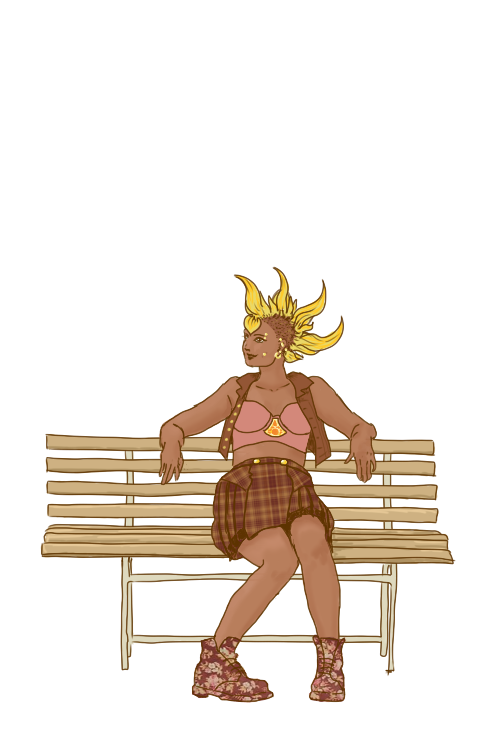
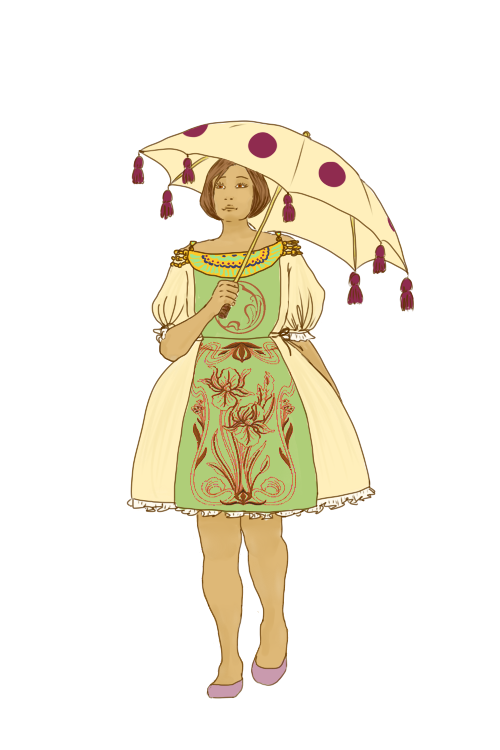

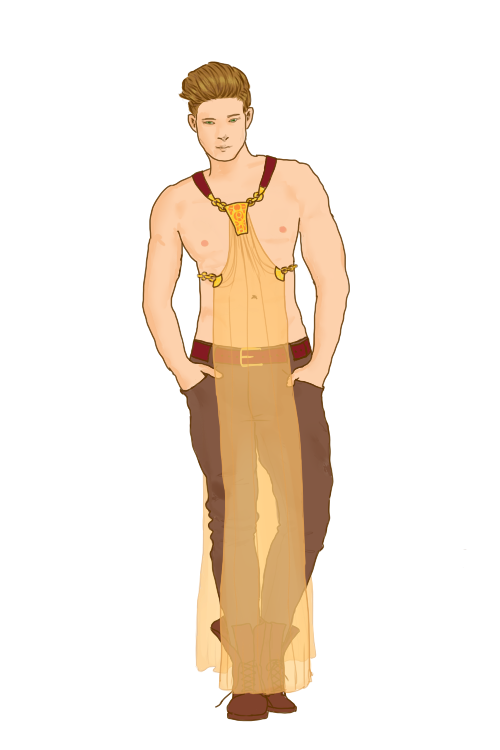
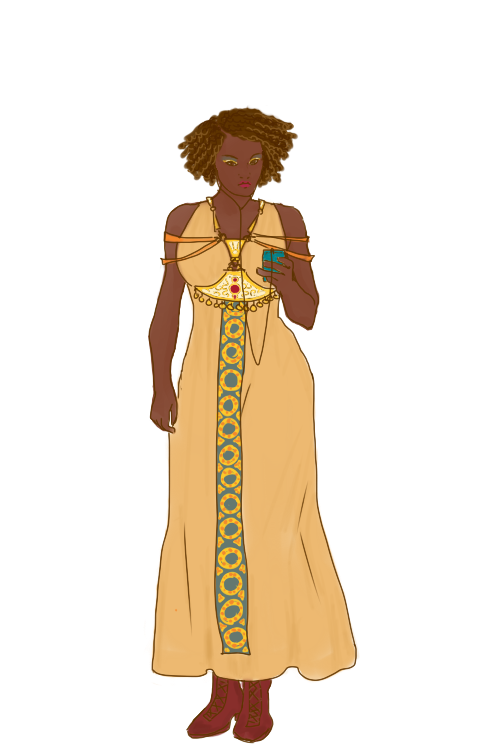
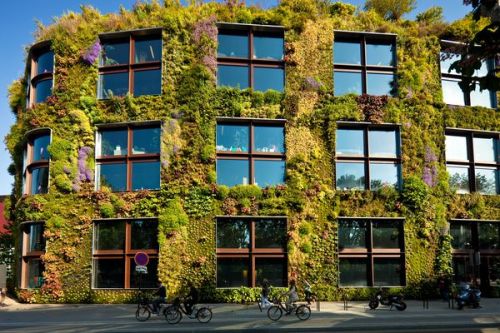
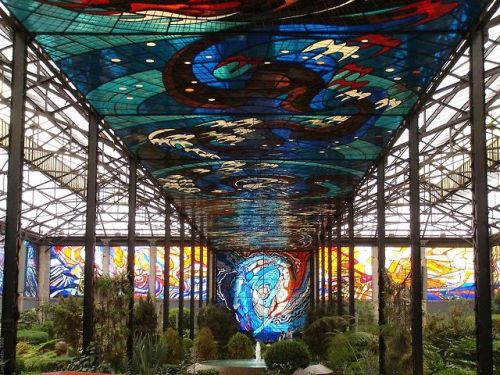
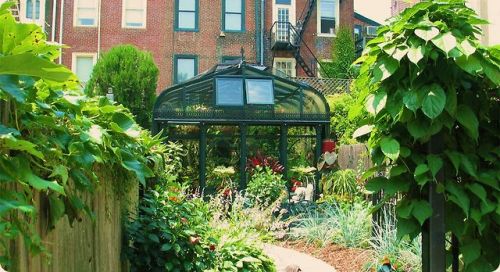
Here’s a thing I’ve had around in my head for a while!
Okay, so I’m pretty sure that by now everyone at least is aware of Steampunk, with it’s completely awesome Victorian sci-fi aesthetic. But what I want to see is Solarpunk – a plausible near-future sci-fi genre, which I like to imagine as based on updated Art Nouveau, Victorian, and Edwardian aesthetics, combined with a green and renewable energy movement to create a world in which children grow up being taught about building electronic tech as well as food gardening and other skills, and people have come back around to appreciating artisans and craftspeople, from stonemasons and smithies, to dress makers and jewelers, and everyone in between. A balance of sustainable energy-powered tech, environmental cities, and wicked cool aesthetics.
A lot of people seem to share a vision of futuristic tech and architecture that looks a lot like an ipod – smooth and geometrical and white. Which imo is a little boring and sterile, which is why I picked out an Art Nouveau aesthetic for this.
With energy costs at a low, I like to imagine people being more inclined to focus their expendable income on the arts!
Aesthetically my vision of solarpunk is very similar to steampunk, but with electronic technology, and an Art Nouveau veneer.
So here are some buzz words~
Natural colors! Art Nouveau! Handcrafted wares! Tailors and dressmakers! Streetcars! Airships! Stained glass window solar panels!!! Education in tech and food growing! Less corporate capitalism, and more small businesses! Solar rooftops and roadways! Communal greenhouses on top of apartments! Electric cars with old-fashioned looks! No-cars-allowed walkways lined with independent shops! Renewable energy-powered Art Nouveau-styled tech life!
Can you imagine how pretty it would be to have stained glass windows everywhere that are actually solar panels? The tech is already headed in that direction! Or how about wide-brim hats, or parasols that are topped with discreet solar panel tech incorporated into the design, with ports you can stick your phone charger in to?
(((Character art by me; click the cityscape pieces to see artist names)))
It could happen to anyone. People bury a person alive to scare them or to get rid of them. In this situation, rely only on yourself.
Do not waste oxygen. In a classic coffin there’s only enough oxygen for about an hour, maybe two. Inhale deeply, exhale very slowly. Once inhaled - do not swallow, or you will start to hyperventilate. Do not light up lighters or matches, they will waste oxygen. Using a flashlight is allowed. Screaming increases anxiety, which causes increased heartbeat and therefore - waste of oxygen. So don’t scream.
Shake up the lid with your hands. In some cheap low-quality coffins you will be able to even make a hole (with an engagement ring or a belt buckle.)

Cross your arms over your chest, holding onto your shoulders with your hands, and pull the shirt off upward. Tie it in a knot above your head, like so: This will prevent you from suffocating when the dirt falls on your face.
Kick the lid with your legs. In some cheap coffins the lid is broken or damaged already after being buried, due to the weight of the ground above it.
As soon as the lid breaks, throw and move the dirt that falls through in the direction of your feet. When it takes up a lot of space, try pressing the ground to the sides of the coffin with your legs and feet. Move around a bit.
Whatever you do - your main goal is to sit up: dirt will fill up the empty space and move to your advantage, so no matter what - do not stop and try breathing steadily and calmly.
Get up. Remember: the dirt in the grave is very loose, so battling your way up will be easier than it seems. It’s the other way around during a rainy weather however, since water makes dirt heavy and sticky.
The war on drugs main consequence was to incarcerate huge numbers of people. There are 2,400,000 people in jail in the U.S. There are 7 times as many people in jail now as in the early seventies. About 1 in every 100 American adults is in jail. About half are there for drug offenses, many just possession.
It’s wild.
We tried prohibition with alcohol. It led to gang violence, people drinking poorly distilled liquor with methanol and getting sick or going blind, and so on. We tried it for ten years and were like, “Hey, maybe this just doesn’t fucking work at all.” And then we tried it with drugs.
Opium (not opiates, mind, but opium specifically) is the only drug whose usage decreased after prohibition, likely because other opiates including morphine and heroin were available. Everything else, usage has increased, and though most have peaked, none are close to their pre-prohibition usage status.
Prohibition has not made us safer and will not make us safer. Ascribing a level of rebelliousness to drugs, teaching kids lies about drugs that make them likely to doubt our word on all drugs rather than teaching them the actual potential harms and being honest, jailing people for ingesting substances on their own terms without harming anyone else (and again, if they do harm anyone else, they should be arrested for that, of course), not regulating the content of the drugs people buy and consume, pressuring people to hide their habits rather than seek help, forcing them into a position of isolation that progresses rather than impedes addiction, creating financial incentive for gangs to sell drugs and war over selling territory–none of these are things that benefit us. Responsibility for casual users and rehabilitation for problem users, honesty about all substances, proper education, healthy discussions, these are things that will make a difference.
I'll believe that governments want to "empower disabled people to achieve employment" when they actually:
Legislate broader work-from-home abilities for jobs that don't actually require in-office presence
Strengthen employment discrimination laws so employers stop thinking that the easiest way to get around having to accommodate a disabled employee is just to fire them
Actually create systems where they, the government, monitor and enforce accessible environments and building codes. The onus shouldn't be on us to get the money to hire a lawyer and sue our own workplaces to get our basic access needs met.
Include disabled people in minimum wage legislation, instead of leaving legal carve-outs where "substandard workers" can be paid subminimum wage.
Allow disabled people to keep savings accounts of our own, which we don't need anybody else's approval to create or spend
Let us form supportive households, relationships, and marriages without taking away our benefits (especially because this means we have no money of our own if we want to leave those relationships)
Until then, nuh-uh. Fuck off. You're not "empowering" us. You're just pushing us further out onto a perilous ledge because you think you can use inspirational supercrip narratives to force us to perform or die.
-
 swirlspill reblogged this · 4 weeks ago
swirlspill reblogged this · 4 weeks ago -
 evefromthenorth liked this · 4 months ago
evefromthenorth liked this · 4 months ago -
 allbotherswithheld liked this · 5 months ago
allbotherswithheld liked this · 5 months ago -
 windmillcrusader liked this · 5 months ago
windmillcrusader liked this · 5 months ago -
 yeetntve reblogged this · 5 months ago
yeetntve reblogged this · 5 months ago -
 grumpygreenwitch reblogged this · 5 months ago
grumpygreenwitch reblogged this · 5 months ago -
 grumpygreenwitch liked this · 5 months ago
grumpygreenwitch liked this · 5 months ago -
 watermelon-shotput reblogged this · 5 months ago
watermelon-shotput reblogged this · 5 months ago -
 dimmeddown reblogged this · 5 months ago
dimmeddown reblogged this · 5 months ago -
 cheeseburger-and-vine reblogged this · 5 months ago
cheeseburger-and-vine reblogged this · 5 months ago -
 cheeseburger-and-vine liked this · 5 months ago
cheeseburger-and-vine liked this · 5 months ago -
 lpx24 liked this · 6 months ago
lpx24 liked this · 6 months ago -
 tuibelle reblogged this · 6 months ago
tuibelle reblogged this · 6 months ago -
 typehoney liked this · 6 months ago
typehoney liked this · 6 months ago -
 rahakasha reblogged this · 6 months ago
rahakasha reblogged this · 6 months ago -
 rahakasha liked this · 6 months ago
rahakasha liked this · 6 months ago -
 longenoughname liked this · 6 months ago
longenoughname liked this · 6 months ago -
 ryulabird reblogged this · 6 months ago
ryulabird reblogged this · 6 months ago -
 unoriginal-nerdy-nickname-here liked this · 6 months ago
unoriginal-nerdy-nickname-here liked this · 6 months ago -
 ninja-nerd reblogged this · 6 months ago
ninja-nerd reblogged this · 6 months ago -
 chronically-done liked this · 6 months ago
chronically-done liked this · 6 months ago -
 apollo-isnt-here liked this · 6 months ago
apollo-isnt-here liked this · 6 months ago -
 sheepscot reblogged this · 6 months ago
sheepscot reblogged this · 6 months ago -
 thecouragetobekind liked this · 6 months ago
thecouragetobekind liked this · 6 months ago -
 gayfertilitygoddess reblogged this · 7 months ago
gayfertilitygoddess reblogged this · 7 months ago -
 ricecakesonice liked this · 7 months ago
ricecakesonice liked this · 7 months ago -
 dandelioncalifornia reblogged this · 7 months ago
dandelioncalifornia reblogged this · 7 months ago -
 dandelioncalifornia liked this · 7 months ago
dandelioncalifornia liked this · 7 months ago -
 hazel-eyedhybrid liked this · 7 months ago
hazel-eyedhybrid liked this · 7 months ago -
 saint-oleander liked this · 7 months ago
saint-oleander liked this · 7 months ago -
 hexagonhexagons reblogged this · 7 months ago
hexagonhexagons reblogged this · 7 months ago -
 klom-pje liked this · 7 months ago
klom-pje liked this · 7 months ago -
 mitlicrbre reblogged this · 7 months ago
mitlicrbre reblogged this · 7 months ago -
 mitlicrbre liked this · 7 months ago
mitlicrbre liked this · 7 months ago -
 lupita-laputa liked this · 7 months ago
lupita-laputa liked this · 7 months ago -
 luckynumber-devon liked this · 7 months ago
luckynumber-devon liked this · 7 months ago -
 deadywitch reblogged this · 7 months ago
deadywitch reblogged this · 7 months ago -
 tailcoatcats liked this · 7 months ago
tailcoatcats liked this · 7 months ago -
 dragonsaccumulated reblogged this · 7 months ago
dragonsaccumulated reblogged this · 7 months ago -
 faeline liked this · 7 months ago
faeline liked this · 7 months ago -
 artsy-dreamer liked this · 7 months ago
artsy-dreamer liked this · 7 months ago -
 thesunshinesonyou liked this · 7 months ago
thesunshinesonyou liked this · 7 months ago -
 acrownforlemmings liked this · 7 months ago
acrownforlemmings liked this · 7 months ago -
 queens-gardener reblogged this · 7 months ago
queens-gardener reblogged this · 7 months ago -
 queens-gardener liked this · 7 months ago
queens-gardener liked this · 7 months ago

a repository of information, tools, civil disobedience, gardening to feed your neighbors, as well as punk-aesthetics. the revolution is an unending task: joyous, broken, and sublime
211 posts